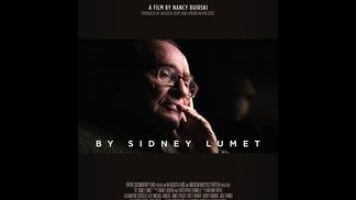Lumet is a tougher subject than he might seem: Celebrated for 12 Angry Men, Serpico, Dog Day Afternoon, and Network, he produced his share of underappreciated work (including his final two films, Find Me Guilty and Before The Devil Knows You’re Dead), but also a high percentage of dross. It’s hard to argue for Lumet as a consistent or even natural filmmaker, but Buirski’s profile takes the director’s uncritical fondness for his own movies as gospel, illuminated through seemingly random excerpts from Daniel (to which Buirski devotes a baffling amount of time), Bye Bye Braverman, and Lumet’s tin-eared adaptation of The Sea Gull, as well as the World Trade Center dance sequence in The Wiz. It takes artfulness to explain art, and By Sidney Lumet has none.
The areas where it holds interest don’t have much to do with film. These are Lumet’s recollections of Jewish cultural and political life in the New York of his childhood; of his father, Baruch Lumet, a hardworking Yiddish theater actor who got the family through the Great Depression by starring on a weekly soap opera on the socialist radio station WEVD (named after Eugene V. Debs); and of his time as a wunderkind director in the television golden age of the 1950s. But one suspects that the emphasis the documentary—which was produced for the PBS series American Masters, but is receiving a limited theatrical release—puts on Lumet’s working life is also its biggest weakness. It leaves Lumet’s self-assessments unchallenged and takes timeliness and personal investment as be-alls and end-alls of quality.
There’s probably something to be gleaned, for instance, in the fact that the movies in which Lumet directly addresses Jewishness (including Bye Bye Braverman, Daniel, and the similarly forgotten A Stranger Among Us) are mostly duds, while the ones that tackle what could be called “classically Yiddish” themes through gentile characters—like the menschlichkeit ideal of integrity presented in Serpico and 12 Angry Men—rank among his best. This is the kind of question By Sidney Lumet has no interest in asking. In fact, it asks no questions at all, letting its subject instead prattle on for the umpteenth time about how much he has always liked “characters who are radicals.”









































